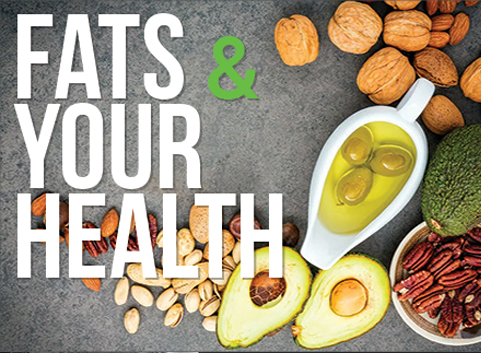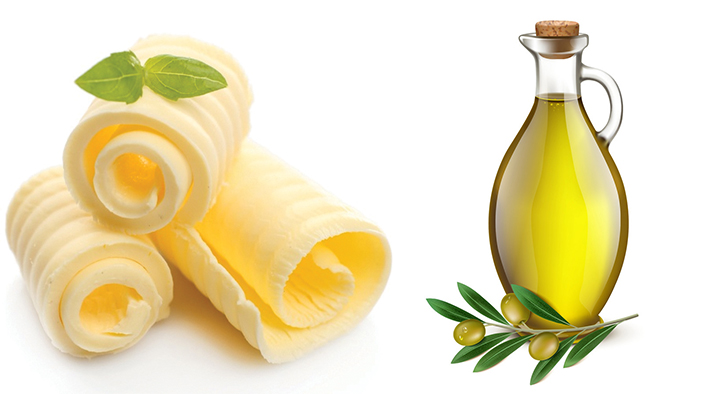Home Diet & Nutrition fats & your health
Fats & Your Health

By Rita Singh
‘It’s a well established fact that FATS are essential, and should not be avoided. Our reverend Rita Mam writes on some basics of FATS”. There are many reasons to control fat intake. Clogged arteries that can potentially cause heart disease or stroke are closely linked with fat consumption.

The type of fat we eat may be wrong too. Butter, cream, hard cheese, sausages, cakes, pastries and meat fats are all extremely high in saturates that increase cholesterol and block arteries.
Vegetable oils on the other hand such as olive, corn and sunflower and also oils from fish such a salmon mackerel and herring are safe – in some cases, even beneficial.
Fat is the most concentrated form of energy containing weight for weight more than twice the calories of carbohydrates or protein. Dietary fat is easily converted into body fat and stored as excess weight. But although most of us would probably benefit from cutting down all fat, no one should try to avoid it completely.
Fats and oils are needed to make hormones; fats are needed for the absorption of fat soluble vitamins A, D, E, and K. We also need to obtain certain essential fatty acids (the basic constituents of fats) from the diet, since they cannot be made in the body. Fat also enhances the flavour of food and creates a pleasant feeling of fullness.
In general, it is good to keep a watch on the overall amount of fat, substitute lower fat foods for higher fat ones and increase the proportion of fish and vegetable oils to animal and dairy fats.
SATURATES AND UNSATURATES
Most of the fats in your body as well as in food are made up of compounds called fatty acids. These are basically chains of carbon atoms which may or may not be chemically bonded to hydrogen atoms.
If the fatty acids contain as many hydrogen atoms as they can possibly have, they are called saturated fatty acids.
If one pair of carbon atoms is free, it is called monounsaturated and if several pairs are free, it is said to be polyunsaturated fatty acids.
The fats and oils that we eat are a mixture of all fatty acids. In general, harder fats like butter, margarines have more saturates; soft fats (vegetable oils, fish oils) have more unsaturated fats. Meat, dairy, palm oil, animal fats and coconut oil are high in saturates. Olive oil, peanuts, avocados are rich in mono-saturates and sunflower oil, oily fish such as mackerel, nuts are high poly-saturates.
Saturated fats can increase blood cholesterol while mono-saturates and poly-saturates can help to reduce it, particularly the harmful LDL which is responsible for blocking arteries.
POLY OR MONO
The only fatty acids that you actually need in your diet are two polyunsaturates (EFA). All others can be manufactured in the body even if you eat no fats at all.
However, they should not also be in large quantities. A very high intake of polyunsaturates is associated with increased risk of cancer and polyunsaturates also reduce beneficial HDL. Monosaturates however have a purely protective effect and should be a part of the diet. It is advised to increase the amount of polyunsaturated fats coming from fish oil such as from herring and mackerel.
Fish oils are the major source of omega 3 fatty acids which counteract heart disease and may relieve certain inflammatory diseases such as rheumatoid arthritis. Apart from this, you will get all the polyunsaturates you need from a varied diet including foods such as nuts, seeds, cereal, lean meat and even green vegetables.

IRON AND CALCIUM
You may feel that cutting down on high fat foods like meat and dairy may make you lose minerals like iron, calcium, vitamins and proteins. But you can opt for lean cuts in meat and low fat dairy option.
You must also include iron-rich foods in your diet such as green leafy vegetables, pulses and cereals.
Low fat milks contain as much calcium, protein and B vitamins as ordinary full-fat milk but less of the fat soluble vitamins A and D.
You can easily compensate by including more brightly coloured vegetables and fruit for beta-carotene and make sure you get some exposure to sunlight for vitamin-D.
The benefits of cutting down fat far outweigh any slight differences in nutrition obtained from meat and milk.
BUTTER OR MARGARINE
Since Butter is high in saturated fatty acids and can contribute to heart disease, margarine made from polyunsaturated vegetable oils was recommended as a healthy alternative – but now this has also come under criticism.
During margarine manufacture, liquid oils are turned into a solid spread by the process of hydrogenation, which involves bubbling hydrogen gas through them. This changes the chemical structure, creating saturated fatty acids and trans-fatty acids, which can adversely affect heart health.
Some manufacturers are trying to reformulate their products to reduce the trans-fatty acids content. The best advice, however, is to substitute vegetable oils like olive oil, rice bran oil, rapeseed oil for butter and margarine.
Trans-fatty acids will also be present in all processed foods that contain hydrogenated oils. Read the labels and stay away from hydrogenated vegetable oil.
OLIVE OIL
Rich in monounsaturated fatty acids which lower blood cholesterol and protect the heart. Olive oil is graded according to the means of extraction and the acidity level – the lower the acidity, the better the taste. Extra virgin and virgin oil, both come from the first pressing but extra virgin has a lower acidity and is considered finer in flavour.
FRYING
The health risks of frying are directly related to the amount of oil used. The temperature it is allowed to reach and the length of the time for which it is kept at very high temperatures. If oil is kept at very high temperatures for a long time, chemical changes occur that lead to the formation of carcinogenic substances. Reheating oil also is extremely bad for health.
AVOIDING CHOLESTROL
While dietary cholesterol does not automatically turn into blood cholesterol. We must be careful while eating saturated fat.
COOKING METHODS
Using low-fat cooking methods such as grilling, poaching, steaming, roasting, baking, boiling and stir-frying in minimal fat are healthier methods. Making a conscious effort and being aware of the fat content is a great way to keep your overall fitness levels high.